Why it’s ironic that some Hinduwadis celebrate Gandhi’s assassin Godse
The double Yin-Yang appropriation of Godse and Gandhi makes one truly understand the meaning of Otto Van Bismarck’s full remarks: “Politics is the art of the possible..."
Nonsensical Nemo’s Note: I had a far more hilarious title in mind for the piece, but given my delicate constitution that requires black coffee on the rocks in the morning and scotch on the rocks in the evening, I have changed it since my humble personage would prefer not to spend any time in prison.
Politics is the art of the possible, and no one does it better than BJP. From constantly shifting goalposts about demonetization’s benefits to opposing and later passionately championing Aadhaar and GST, the party is adept at riding the gravy train and proactively changing the narrative.
BJP often finds itself in a pickle when the discourse is about the Independence movement as its ideological fountainhead, RSS, had very little influence at that time. While the BJP has tried to lionise its leaders like Deen Dayal Upadhyay or ideological forefathers like Vinayak Damodar Savarkar, what it has managed to do is appropriate many leaders who were traditionally either Congressmen or would’ve been firmly opposed to the modern BJP’s Hindutva avatar. Since 2014, they have tried to coopt various leaders, including PV Narasimha Rao, Sardar Patel, Bhagat Singh, Subhash Chandra Bose, and even, BR Ambedkar. The last one is very hilarious because he’s one of Hinduism’s most vicious critics, a group that the BJP claims to represent.
But, perhaps the greatest of such appropriations, even as some of its most vocal members, including legislators and cabinet ministers, wax lyrical about his assassin, is of the man whose fangs Ambedkar claimed to have seen—Mohandas Karamchand Gandhi. The double Yin-Yang appropriation of Godse and Gandhi makes one truly understand the meaning of Otto Van Bismarck’s full remarks: “Politics is the art of the possible, the attainable—the art of the next best.”
And no one makes it more possible than Narendra Modi, who manages to evoke MK Gandhi whenever he can, even making him the mascot of initiatives like the Swachh Bharat Abhiyan or inviting visiting foreign leaders to spin the chakra at Sabarmati Ashram. While watching leaders of the West is always funny, it is particularly hilarious to watch Churchill-loving Boris Johnson do it. As I’ve written before: “It takes a special level of self-aware shamelessness for a British PM to spin the very symbol that epitomises India’s stand against British imperialistic colonialism but then again, being shamelessly self-aware is Boris’ strong suit.”
This is in stark contrast to the veneration of Godse by several members of the BJP and its supporters, even though many might not voice it loudly. Some however, do. Pragya Thakur, a BJP MP and one of the accused in 2008 Malegaon Blasts, called Godse a patriot, not a terrorist, asking those who called him a terrorist to “introspect”. Former Uttarakhand CM Trivendra Singh Rawat also held the same view. Giriraj Singh, another MP and Union Minister, called Nathuram Godse a “sapoot” (worthy son of the soil). BJP’s state secretary Rameshnaidu Nagothu in Andhra Pradesh hailed Godse in a tweet before deleting it. In the past, the BJP’s official line has usually been that these views are personal.
Historian Ram Guha, a man who venerates Gandhi a little less than he does Nehru, had argued that such views had “risen to the surface” now since the BJP had become more powerful “politically” and “socially”.
He had said: “Privately, the BJP has aways disliked and mistrusted Gandhi and there has always been some admiration for Godse among members. The BJP dislike Gandhi for being effeminate, they believe his non-violence movement made India weak, they distrust him for agreeing to partition and, above all, hate that he believed in equal rights for Muslims. The dislike runs deep, so it’s not surprising that now the BJP are so powerful, both politically and socially, that it has risen to the surface.”
While some, like Nonsensical Nemo, have their faith in humanity restored when they see such hypocrisy, others are often beside themselves with rage when they see the ball spinning both ways. One such gentleman who took visible umbrage was Shahid Siddiqui, a nomadic politician, who has been with Congress, SP, BSP, and RLD. He argued on X (formerly known as Twitter): “Nupur Sharma represents the real face of BJP and RSS. She is honest in her hatred for Bapu, Nehru, Muslims, secularism, and all that India stands for. She is a genuine follower of Godse, unlike other Sanghis who garland Mahatma but hate him and his ideas.”
Now, Siddiqui is also a journalist, which explains his attention to detail, because he confused the editor of a right-wing “propaganda/truth-seeking” website (depending on your worldview) with the former BJP member who is being hounded from pillar to post for losing her cool on national TV and expressing her views of a religious figure.
For the uninitiated, I am referring to the incident that saw a BJP spokesperson outburst on national TV following a Muslim cleric’s jokes about a Shivling – an incident that was assiduously propagated by a dog whistler masquerading as a fact checker—which has painted a lifelong target on her back like Salman Rushdie’s. In the aftermath, we saw virulent protests that claimed the lives of numerous Hindus and Muslims. Of course, while reporting the incident about a Hindu being beheaded in Udaipur, the shared image by BBC seemed to suggest that it was Hindu vigilantes that were responsible for the beheading. But I digress.
Like a broken clock, which accidentally tells the correct time twice a day, Siddiqui’s assessment is half-correct about BJP and Gandhi-Godse.
India’s political Overton Window is constantly expanding, and things that were the norm 20 years ago, are considered an absolute taboo in this day and age. A movie like Main Hoon Na, which shows Pakistan in a good light and goes out of its way to show a former Indian Army Major as the main antagonist, would never even be conceived, let alone be released at present. Even today’s so-called rebel-against-the-regime movies like Pathaan or Jawan are very much on the same page as the government of the day on most issues, including Pakistan or Article 370.
For example, in 2004, despite the Kargil War a few years ago, Vajpayee’s NDA sent an Indian cricket team to Pakistan. The olive branch was rewarded with a lovely visit to Mumbai by some charming young men.
The world is very different today, and a majority of the Indian public has no delusions about Pakistan and its terror state, and in fact, probably treat it with more disdain than many members of the current government. Even Bollywood has fallen in line, ignoring some of their shared lineage, and suppressing their desire to put Fawad Khan’s jawline on the big screen.
A similar political worldview has metamorphosised about Gandhi (and, by extension, Godse). Discussing MKG’s fallibility is no longer taboo. It’s not as dramatic as Gregor Samsa to a huge bug, but several of his views and actions are now loudly questioned. It’s no longer considered suicidal to criticise or question Gandhi. However, before we get into BJP’s complicated Gandhi-Godse balancing act, a few words on MKG.
MKG was very much a product of his time.
Perhaps if he was alive today, he’d be writing vacuous articles for Indian Express where he makes a major religion sound like Mary Jane and taking bike rides that play well on Instagram reels. Politicians and activists are after all flesh-and-blood creatures, and unless we could run real-world simulations, it would be impossible to tell how they’d behave in this day and age. Would Bhagat Singh have remained a staunch communist after he saw the atrocities carried out by those who say Lal Salaam, from the USSR to China? Or would he have been driven to impale Fidel Castro on a stake after hearing his seven-hour-long speeches, or would simply have given up on communism after getting his first iPod?
Would Subhash Chandra Bose have remained an anti-imperialist after seeing the atrocities carried out by the Axis? Would Sardar Patel have flipped to BJP once he saw how anti-Hindu the Congress had become?
Now, let’s be clear, whatever your views on Gandhi or moral scruples with his experiments with truth, Gandhi’s achievements are remarkably tangible even though I don’t completely agree with the dangerously quixotic founding myth that India won its freedom through “ahimsa”. As I wrote in the piece about RRR: “It’s downright hilarious to think that an Empire that had no qualms about gassing tribes, shooting down innocent civilians in cold blood or even throwing children into concentration camps would leave of their own accord because they were moved by morals.”
The Brits left, as many authors have pointed out, perhaps none more eloquently than HT’s editor-in-chief in 1947, Durga Das, who wrote on the day of Independence in a piece titled Journey’s End – beginning of another:
“Freedom has dawned. It has broken in upon us earlier than most Indians expected, much earlier than any Briton imagined. It is the greatest event in India’s long and chequered history since it marks the end of the 1,000-year-old subjection to the rule of a succession of foreign conquerors. It has happened because India had made up her mind to close the chapter of her slavery; it has come about suddenly because Britons made up their mind that their Indian business had become a liability, and they must cut their losses. World War left Britain shaken but not insolvent. The income from its foreign investments and services filled the adverse gap in imports and exports.”
There’s no denying that while it’s preposterous to think that Brits left because of moral scruples, Gandhi’s larger-than-life figure played an important role in hastening Independence along with a newly beggared post-World War 2 Great Britain.
Gandhi took the Indian Independence movement from a wet dream of elite Bombay lawyers and made it a pan-national revolution. In doing so, as I’ve written before, he became the prototype of the modern-day Indian politician who cuts across parties. He wielded power without holding a constitutional post. He used morality as a shield to deflect criticism.
He started a cult of personality, which built up to not allowing any opposition. He was anti-science and followed a self-serving circular logic that he was always right. He abhorred sex and used austerity as a virtue one should aspire to. He placed religion, not rationality, at the centre of his political beliefs. He decided who’d become PM, irrespective of who got the popular votes. He wore the robes of a priest pretending to be a politician, and we’ve seen many iterations and variations of this kind of politician since Independence.
Critics (and fans) of both parties will recognise—often in the behaviour of their opponents because self-criticism is suicidal in politics—the classic Gandhi traits.
Narendra Modi often evokes his impoverished childhood and lack of familial attachment to suggest his incorruptibility.
Rahul Gandhi, the son, grandson, and great-grandson of former Premiers, claims that he’s a non-materialistic sage at heart.
Mamata Banerjee isn’t seen anywhere without her slippers and plain cotton white saree, and the same goes for Arvind Kejriwal, who always ensures that he’s living up to the middle-class ideals by wearing a shirt that’s two sizes too big for him.
Sonia Gandhi showed that one didn’t have to become PM to be the most powerful person in the country. Like Gandhi, many Indian politicians also wear a vow of celibacy as a badge of honour.
The point is Gandhi set the anti-scientific, anti-industrialist tone that would be embraced by politicians across spectrums and helped create a country and economy that was teetering on the brink of recession. In fact, one ought to thank Nehru for having a mind of his own and imbibing the nation with a degree of scientific aspiration and industrialisation, junking the idea of 1000 villages fuelled by chakra-spinning, which saw us become the first nation to land on the dark side of the moon.
On the other side, we’ve his bete noire: Nathuram Godse, whose assassination of Gandhi put him on par with assassins like James Earl Ray, John Wilkes Booth, and Lee Harvey Oswald. With this assassination, Godse managed two things: cementing MKG’s status as a beatified Mahatma and pushing the Hindutva movement back by decades.
Godse’s actions turned out to be the final stroke of fate’s brush in Gandhi’s ascendancy to sainthood, ensuring we didn’t see him become a bitter old anti-corruption BDSM enthusiast who comes up with things to protest about whenever he feels like he needed to do some intermittent fasting, which can be about anything: from a supermarket’s decision to sell wine to a late Swiggy order.
By assassinating Gandhi right after Independence, Godse ensured Mahatma's halo would never fade. History is replete with such examples that whenever a hero spends too much unwanted time on this planet, he is eventually run down by human follies. Even Nelson Mandela would be remembered, in his last days, as an AIDS denialist, whose silence ensured that by 1998, 13% of South Africa’s population was HIV positive. Among those dead was his own son. But Godse ensured that wouldn’t be Gandhi’s fate.
Secondly, Godse guaranteed that his actions would put all Hindutva factions, including the RSS, back by several decades, which makes his ascendance as a hero of the Hindutva fringe even more ironic. After Gandhi’s assassination, Sardar Patel banned (and later unbanned) the RSS. When SP Mookerjee, who later founded the Jana Sangh, the predecessor of the BJP, criticised Patel for the RSS ban, Patel pointed out that the “RSS presented a clear threat to the functioning of the government and the state” and that they even “distributed sweets” when Gandhi was killed. However, Patel didn’t believe that RSS was involved in his assassination.
This slight detour down memory lane is important because one has to understand how the Hindutva genie was pushed back into the bottle because of Godse’s actions, making political Hinduism akin to political suicide. It’s impossible to ascertain how many years the political Hindu had to hide behind the façade of secularism before being vocal about one’s political beliefs. In fact, one could argue that it wasn’t until the Emergency and then the Ram Janmabhoomi Movement that political Hinduism again became acceptable amongst Hindus for whom Gandhi’s murder would always be linked to Godse.
Of course, some still see Hindutva through that particular prism, and if you pick up any foreign publication, Hindutva is mostly described by terms reserved for Nazis because that’s the only evil white folks can comprehend. After all, Hitler did the one thing that is considered truly, truly despotic, and genocidal: killing other white people.
If you were a foreigner reading about the Hindutva, you would assume it has three raison d'êtres: To make the lives of Muslims ‘miserable’, make everyone eat vegetarian food, and promote Brahminical patriarchal casteism from California to Cape Town. That’s how it’s described everywhere, by emotional truth enthusiasts; comedians who lecture folks on taxes for the super-rich while finding ways and loopholes to bypass them, or folks who take a break from diatribes about racism to make racist remarks about Indian accents.
The truth is that Hindutva (which some adherents claim is Hinduism resisting) is a far more complex issue, a political one that requires a deeper understanding without malice or prejudice. That’s not to say Hindutva doesn’t have people who are driven completely by anti-Muslim bigotry or suffer from gustatory exclusionary behaviour (including from those very high up in the government), but to use that to paint an entire political movement (and at times, the religion behind it) with the same brush is deeply unhelpful. Like any complicated movement, it comes with numerous sub-groups, where the Trotskytes and Leninists are replaced by Trads and Raytas.
Hindutva is a movement that fuels the world’s biggest democratically elected political party and deserves a far better perspective than the myopic garbled tale that is presented as its story.
But to return to our main point, while it’s good ol’ politics to see BJP leaders be Gandhi on the streets and Godse in the sheets, it’s particularly hilarious that their hero is the man responsible for pushing Hindutva back in time. But fate, as Morpheus pointed out, is never without a sense of irony. Perhaps that’s the irony that bestows Godse as a hero of the movement that he almost destroyed forever.
Edited by Alekhya Boora.

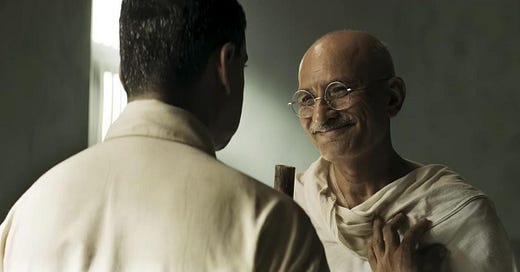



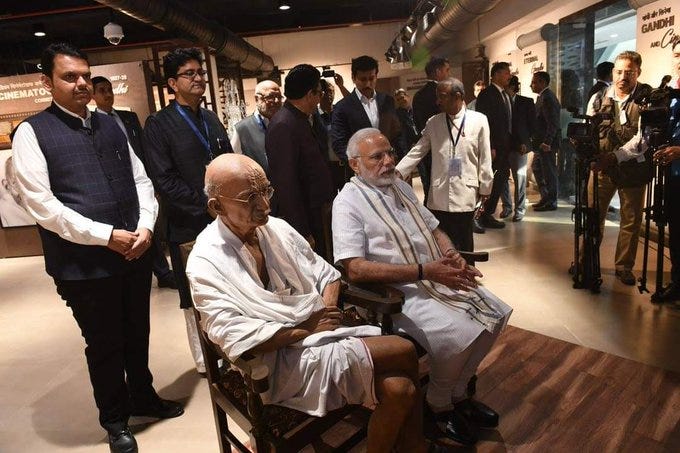

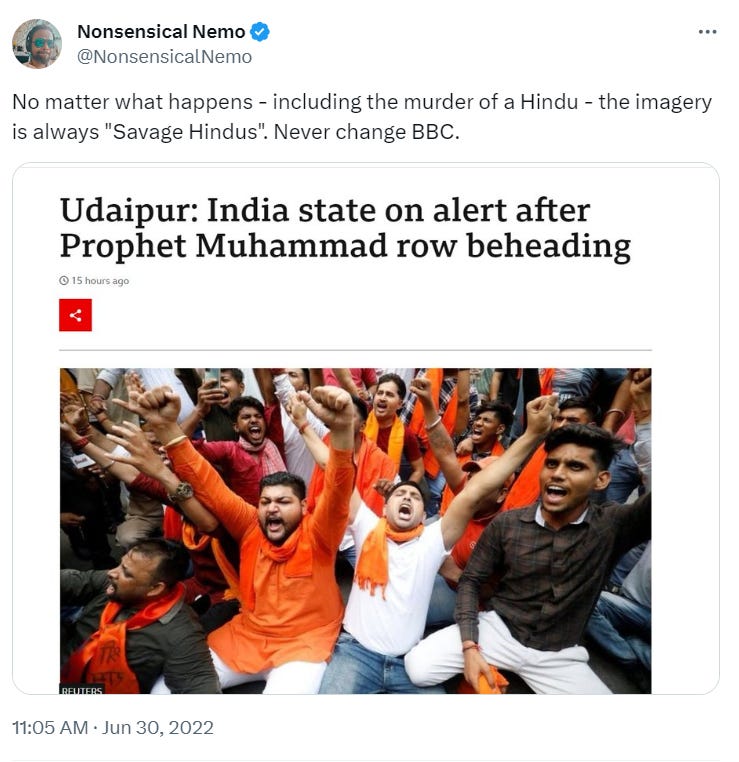

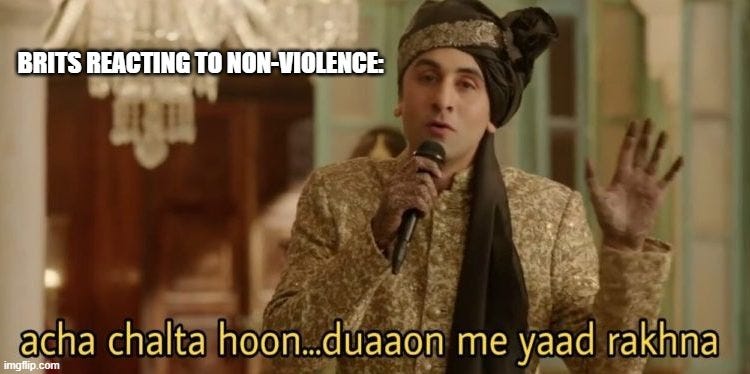

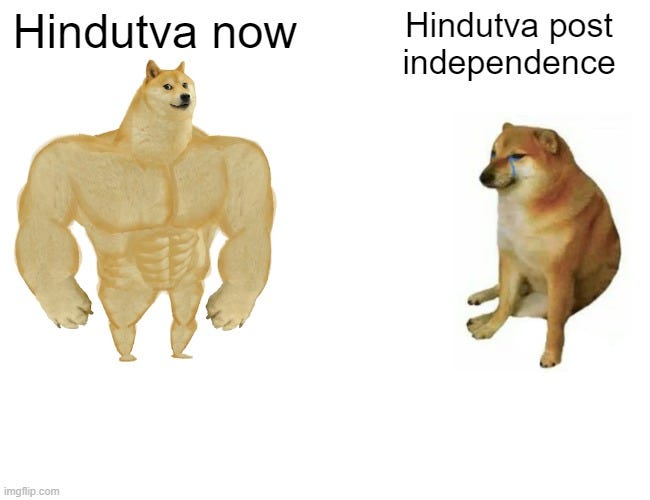
A really moving piece with deep insights!